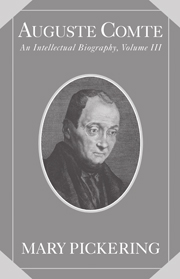Book contents
- Frontmatter
- Contents
- Acknowledgments
- Abbreviations and Notes
- Introduction
- 1 The Coup d'Etat and Its Consequences
- 2 Comte's Stumblings
- 3 The Vicissitudes of Positivism during the Early Empire
- 4 Système de politique positive: Natural and Social Philosophy
- 5 Système de politique positive: Comte's Philosophy of History
- 6 Système de politique positive: Comte's Utopia
- 7 The Last Years: Politics and Propaganda
- 8 The Last Flurry of Activity: The Testament and Synthèse subjective
- 9 The Death of the Great Priest of Humanity and His Influence
- Conclusion
- Bibliography
- Index
- References
7 - The Last Years: Politics and Propaganda
Published online by Cambridge University Press: 06 January 2010
- Frontmatter
- Contents
- Acknowledgments
- Abbreviations and Notes
- Introduction
- 1 The Coup d'Etat and Its Consequences
- 2 Comte's Stumblings
- 3 The Vicissitudes of Positivism during the Early Empire
- 4 Système de politique positive: Natural and Social Philosophy
- 5 Système de politique positive: Comte's Philosophy of History
- 6 Système de politique positive: Comte's Utopia
- 7 The Last Years: Politics and Propaganda
- 8 The Last Flurry of Activity: The Testament and Synthèse subjective
- 9 The Death of the Great Priest of Humanity and His Influence
- Conclusion
- Bibliography
- Index
- References
Summary
Man always aspires to achieve unity on both a personal and a social level, for there reside his duty, happiness, and even his health. Because this permanent concentration of our existence can no longer be related to God…, it can henceforth entail no other source but Humanity, which at first created gods to guide itself before being able directly to guide its servants.
Comte to Tholouze, January 4, 1856.FLOUNDERING BETWEEN REVOLUTION AND REACTION
Recent historians have remarked that during the early years of the Empire, at least until 1857, “political life appeared as if it had stopped” in France. With the Second Empire formally established in December 1852, Napoleon III was in firm control. Life at the court seemed to set the national agenda. The intense police activity and censorship of the press reinforced the feebleness of the republicans. Comte was struck by the fact that mental and moral anarchy had spawned mediocre leaders “in every genre.”
He became increasingly disdainful of leaders on the left when they did not cozy up to him after repeated efforts to get their attention. In 1853, he sent volume three of the Système and the Catéchisme to Caussidière in New York, where he now lived. Nothing came of that effort. Yet Comte believed he was coming closer to fulfilling his dream of attracting prominent leftists when in mid-1854 the mother of Blanqui and one of his friends visited him and told him that the great revolutionary had become a positivist ready to recognize Comte as his spiritual leader.
- Type
- Chapter
- Information
- Auguste ComteAn Intellectual Biography, pp. 394 - 473Publisher: Cambridge University PressPrint publication year: 2009



